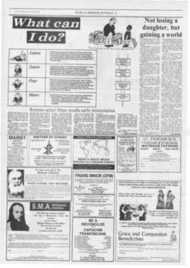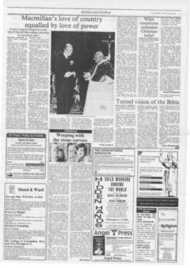Page 5, 21st October 1988
Page 5

Report an error
Noticed an error on this page?If you've noticed an error in this article please click here to report it.
Tags
Share
Related articles
Church Urged To Aids Ministry
Coping When A Friend Has Aids
To Be A Christian In The World
Ioceses Ea
2002 A Testing Year
San Francisco's call to compassion
Cyril Ives reports on the Californian bishops' response to the Aids crisis
DURING the summer, I was privileged to work as a volunteer with the AIDS/Aids Related Complex programme of the Archdiocese of San Francisco. It was a long way to go for the experience, but the lessons learned are relevant to the work and life of all Christian people.
AIDS is a human disease which can affect everyone, and test the quality of our faith and family and community relationships. It is unique in the way that it is stigmatised, and in the way in which people with AIDS can suffer rejection and isolation from those who are usually first to offer care for the sick and dying.
The Church in San Francisco has struggled for years with its commitment to offer the compassion of Christ to all, and the Church's teaching on issues surrounding morality and sexuality.
The breakthrough came when theological concerns were overtaken by the personal encounters of the bishops in California with people with AIDS, and the issue in 1987 of a pastoral letter under the title "A call to compassion". In this letter the bishops encouraged people to escape from irrational fears of the disease and respond instead in a rational and Christian manner, emphasising the responsibility of individual citizens to become informed about AIDS and to work towards its prevention and treatment. In terms of responsibility for caring for the sick, the bishops pointed out that Jesus placed no conditions on His expression of concerns for the outcasts and wounded of the world, and that our response to those who are ill should be that of compassion not judgement.
Without any doubt this letter has had a considerable influence on the care and support offered to people with AIDS throughout California. By spelling out clearly the need to embrace all persons affected and the need to offer unconditional love together with faith and hope, the Church at last joined the great army of workers giving time and energy to cope with the daily increasing numbers of very ill people in the community.
Of course, making this statement was not in itself enough, and the bishops came under attack from all quarters. Compassion is all very well but without money very little ;practical caring could get under way. Individual priests, several of them HIV positive, felt able to use their own situation to appeal for funds to set up projects, but little money was forthcoming from parishes.
There were notable exceptions. The parish of the Most Holy Redeemer was on the decline. Situated in the "gay" Castro area, the Church had originally been set up to serve the mainly Irish population at the turn of the century, and as the old time parishioners died off, nobody came to replace them.
In 1983 relationships between the archdiocese and the gay community seemed irreconcilable but AIDS has forced the community and the Church to replace confrontation with compassion. Now, the older parishioners have come together with the new churchgoers to help relieve the suffering. Parish support groups have been set up to visit the sick, and fund raising activities organised to raise money for a hospice in the parish. Archbishop Quinn became more personally involved, presiding over a special 40 hour devotional mass for people with AIDS at the Most Holy Redeemer Church.
Church commentators describe Archbishop Quinn as going through a tremendous spiritual revival over the AIDS issue, and he has become more and more outspoken when provoked by fundamentalists speaking of AIDS as "God's wrath".
"It would be a great mistake if we were to see this massive epidemic only as an occasion to speak about the moral principles of sexual behaviour" the archbishop wrote in the Jesuit magazine America. "Many pastors who are working on a daily basis with persons with AIDS see in it a call to a deeper
conversion and healing Sickness, while it is closely related to man's sinful condition, cannot be considered a punishment that man suffers for his personal sins."
The informal groups at the Most Holy Redeemer have developed into a neighbourhood support system. Groups of volunteers clean the home of the sick person, take them to the doctor, shop, visit, and do all that is needed so that they can remain in their own home. An unused convent has been refurbished to provide hospice care for those who are very sick with special needs.
The AIDS/ARC programme of Catholic charities is the largest single project in the city, offering funds for alternative therapies and residential care for the most difficult to accommodate AIDS patients, those with additional problems of drug or alcohol addiction or anti-social behaviour. This summer the residential programme moved into purpose built premises and can now offer a home to 30 people, with onsite social workers, counselling, financial advice, medical referrals and client advocacy. The small staff is supported by volunteers from around the world, who see this as an opportunity to offer service while increasing their knowledge and skills.
Writing in the San Francisco Catholic, the diocesan AIDS chaplain, Fr Leo Hombach, says that "AIDS will test the human community's ability to see beyond our differences."
"Whatever the practical needs — cooking, cleaning, shopping, walking the dog the spiritual part of the ministry is essential" says Joan Healey, Director of a community support group. "When you see someone fading away like that, you see the broken body of Christ."
There is no doubt that the archdiocesan policies and programmes opened up the way for other individuals, groups and agencies to offer service within the Church. Food collections and deliveries, home visits, healing services, telephone hotlines, parish educational programmes are just a few of the new initiatives.
Cyril Ives
blog comments powered by Disqus













